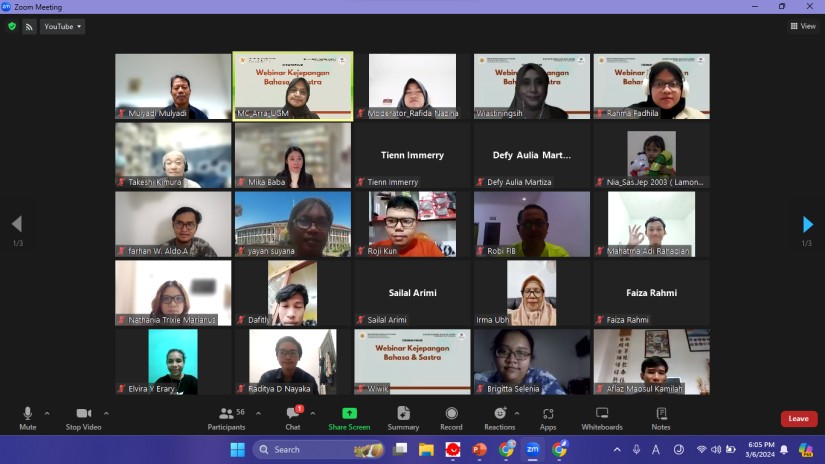
On Wednesday, March 6, 2024, the UGM Japanese Language and Culture Study Program (BKJ) held a webinar entitled ‘Japanese Language and Literature Webinar’. The webinar was attended by more than seventy participants combined between BKJ Study Program students and students outside the study program who have an interest in Japanese Language and Literature.
The webinar took place in two sessions, with the first session by Dr. Mulyadi, M.A. as a lecturer in Linguistics of the UGM Japanese Language and Culture Study Program and the second session by Prof. Mika Baba who is a lecturer in the Literature sub-program of the Bachelor of Cultural Sciences and Literary Sciences Program from the University of Tsukuba.
The first session was an explanation of ‘The Use of Japanese in Naming Business Entities in Lamongan Regency’. This session began with the presentation of data on the naming of business entities using Japanese taken from Google Maps. There were twenty business names from various fields that used Japanese. The data shows that the Japanese language and culture are considered to have a high appeal in attracting customers, especially among young people.
The session continued with a discussion on ‘Personal Pronouns as a Method in Modern Japanese Literature’ by Professor Mika Baba. His research focused on literary works in the second half of the 19th century (1850-1900). In Japanese literature, first person pronouns are used such as 「私」watashi,「余」yo,「己」onore,「我」ware,「僕」boku,「俺」ore, and「自分」jibun. All seven first person pronouns have the same meaning of I or me. The difference lies in the time of use such as 「余」yo which is no longer used, and「己」onore and「我」ware which can still be seen today in literary works set in the past. Another difference lies in the gender of the user. The pronouns 「僕」boku and「俺」ore are mostly used by men, while 「私」watashi is mostly used by women. Lastly, the pronoun 「自分」jibun is generally used when expressing personal opinions in a public forum.
By holding Japanese literature and language webinar activities from the two speakers, it is hoped that students can gain new knowledge related to the use of Japanese both in practice and theory. The knowledge gained later can also be utilized by academics to explore this field.

